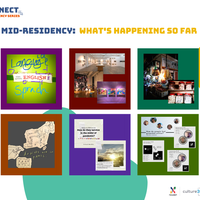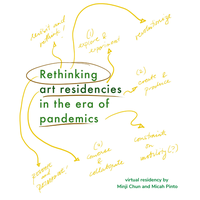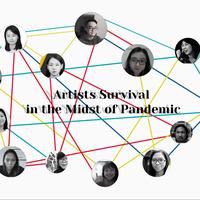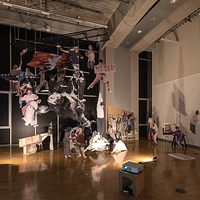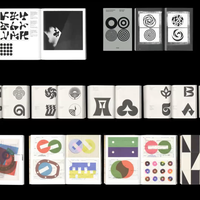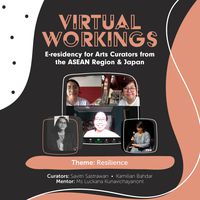Virtual360 Konnect | Spirit of Rice
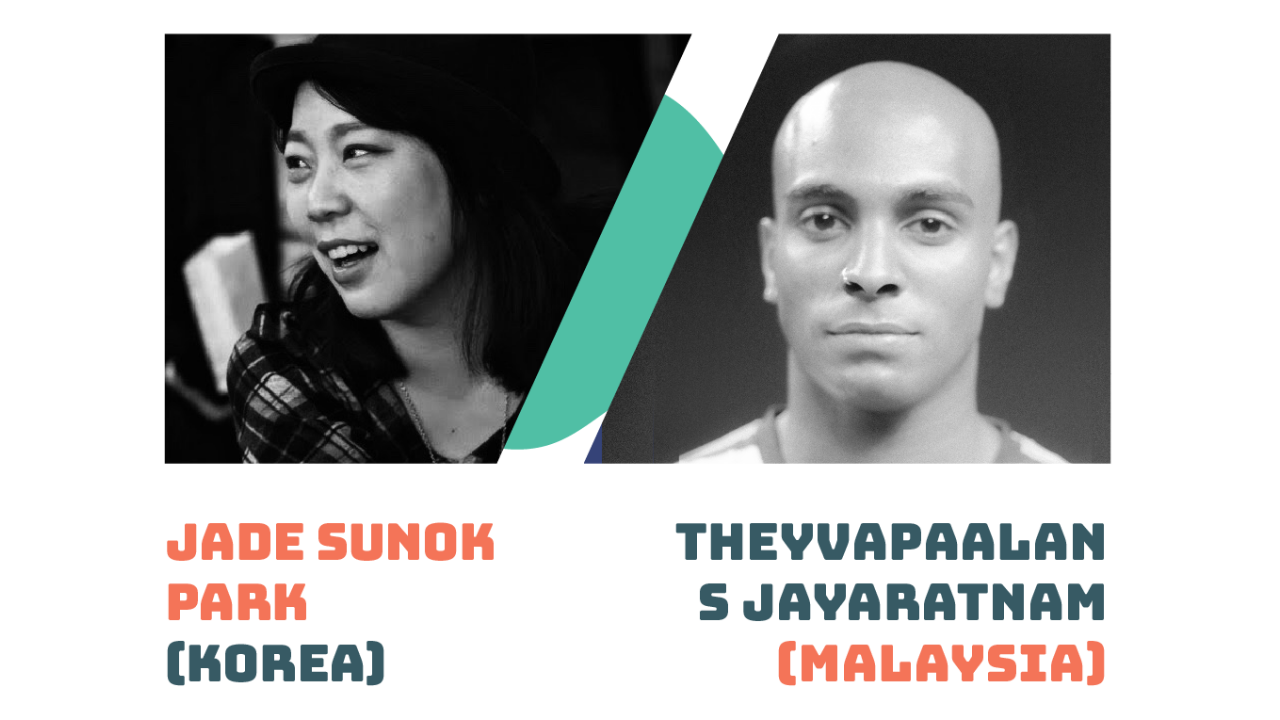
Jade Park, an artist and psychotherapist from Korea, and Theyvapaalan S Jayaratnam, an artist from Malaysia, are participants of Virtual360 Konnect – Emerging Arts Leaders Virtual Residency Series. The pair collaborated on 'Spirit of Rice', an experimentation project that sought to draw parallels between the fermentation process of rice wine and the isolation brought about by the pandemic, as a means to reflect on our environment and engage in meditative introspection.
The fermentation process of rice wine can be prolonged into an ongoing one. This makes the drink alive. There is no end product, just a constant process of converting sugar into alcohol and carbon dioxide. A liminal drink if you may. Queer beings and people who have survived tramendous constanious trauma, according to Andrew Solomon, have discovered a way of surviving these experiences by forging meaning for themselves and building identity. They have to (almost constantly) make sense of themselves and their surroundings in order to navigate through their surroundings / habitats/ environments and move forward. Due to the nature of this pandemic and how little we know about the virus, we keep forging meaning and finding ways for ourselves, our communities and environment to survive. We only risk hurting ourselves and our planet if we remain stubborn, stay stagnant and hold on to our old ways and ethics.
For this experiment, we made two types of rice wine: Makgeolli and Tuak. Makgeolli is a Korean unfiltered rice wine which is creamy and sweet, much like nigori saké. It is fermented, full of healthy bacteria and tastes like yogurt, despite being dairy-free. The main difference between saké and Makgeolli are the yeasts and the fermentation time. Makgeolli is traditionally made with nu ruk, a wheat yeast, while saké uses koji and specific strains of saké yeast. By using koji to make Makgeolli, however, it ferments with a saké flavour.
Tuak is a Sarawakian rice wine that is similar to Japanese saké. Unlike the carefully calculated process in making saké, part of Tuak’s appeal is that it is unrefined and unpredictable. It is passed down from generations, mostly through the women of certain ethnic tribes in Sarawak and is made by most Dayak natives of the country such as the Bidayuh, Kenyah, Bisaya, Kelabit, Iban and Kayan. Every batch can have a different flavour and bouquet and it is made with the traditional yeast Ragi or Ragi Tape.
Both Tuak and Makgeolli are ‘living’ drinks. Premature batches of both substances contain active yeast that continues to convert sugar into carbon dioxide and alcohol when kept at room temperature. It is said that some longhouse elders have aged their Tuak for as long as 20 years.

Our Keywords for the different stages of making Tuak and Makgeolli
Andrew Solomon made 2 crucial points in his Ted talk titled ‘How the worst moments in our lives make us who we are’. The first being, in tough times, the way we survive is to forge meaning and build identity, forge meaning and build identity, forge meaning, and build identity. He recites it like a mantra. Then later, parallel to the first point, we arrive at Nirvana when we only have bliss to look forward to and find in what looked like sorrows the seedlings of our joy to find in what we perceive as sorrow the seeds of joy. This second point he learned from a Buddhist scholar.
Jade Park suggested that we make rice wine and draw from the process of making Makgeolli and Tuak on how to act during the recovery phase of the pandemic, and the idea immediately intrigued us. Jade was essentially suggesting we conduct an experiment to forge new meaning. In order to survive the pandemic, we as individuals and as a society must forge new meaning and discover new ways of living, or coping rather. How can we move forward from this global devastation? How not to repeat the mistakes that might have led us here? How can we do better for our planet, our people, ourselves?
The conclusion we drew from this experiment, specifically when we discussed the fermentation processes of Makgeolli and Tuak gave us the effect of pause in our everyday life. We allowed ourselves to distance from an environment of constant impulses and to be aloof from the ups and downs, hot and cold of the pandemic. We wanted to mirror the process of making Tuak and Makgeolli which demanded time and waiting, which in turn allowed us plenty of reflection.
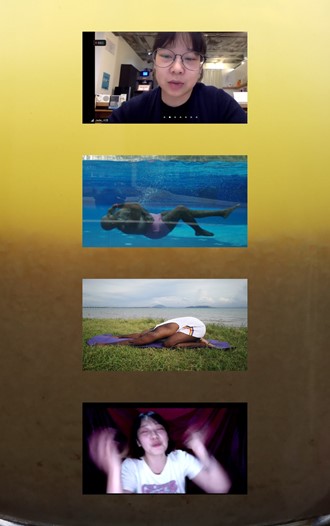
Jade and Paalan against a jar of Tuak
The fermentation process is minimal and simple, but when the lid is opened, the liquid breathes, pushing out the small bubbles of carbon dioxide, similar to when we exhale. We shared with each other how our rice wines have fermented and discussed how our days had fermented, in a sense, as well. After about two weeks, we filtered out the alcohol and spent more time waiting in patience. After a week or so, the blurry liquor gradually separated into two layers, a clear top and an ivory-coloured liquid. As we watched each other's drink through the monitor, we arrived at a very clear realisation. We did not heat or do anything special to the alcohol during fermentation, rather just waited for the drink to mature. The time of pause, and of waiting, brought clarity to many of our puzzling questions and conflicts. It is as if we, like the boundaries of this liquid had become clear.
References for further reading
https://www.ted.com/talks/andrew_solomon_how_the_worst_moments_in_our_lives_make_us_who_we_are/transcript?language=en#:~:text=But%20he%20said%20that%20would,the%20seedlings%20of%20your%20joy
This article is part of a series of articles written by the participants of Virtual360 Konnect - Emerging Arts Leaders Virtual Residency Series, an online cultural exchange and capacity building initiative developed by the Asia-Europe Foundation (ASEF) and the ASEAN Foundation through KONNECT ASEAN. Over a period of one month, 20 emerging art leaders from Korea and 5 countries of the ASEAN region (Brunei Darussalam, Indonesia, Malaysia, Myanmar, Philippines and Singapore) collaborated in pairs on the theme of international cultural exchange in the Covid-19 era.
Jade Park is a performer and a psychotherapist who currently runs a creative organization called ‘The Way to The Picnic’ from 2015. She started her career as an actress and now she is working on combining the cultivative arts activities such as theatrical treatment and psychosomatic treatment with the community.
A graduate of the Performance and Media Department of Sunway University, Theyvapaalan S Jayaratnam is a multidisciplinary artist grounding themselves in theatre, photography and film. Their works gravitate towards the discussions of the relationship between beings and our environment and the treatment of minority bodies from migrant communities and queer bodies.
Jade and Paalan met during a cultural exchange residency, called ‘The Living Project’ at Emptyspace in Chiang Mai In February 2020 involving artists from 4 countries, Thailand, Korea, Malaysia and Japan. During this residency, they discussed elements that connected them from these 4 countries centering the consumption, reverence and appreciation of rice. They particularly gravitated towards the spirit of rice and the myths surrounding her from each of our countries.

